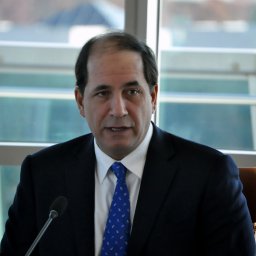
Aims to Address Shortage of Mental Health Care Access, Encourage Professionals to Practice in Underserved Areas
TRENTON – A leading advocate for mental health reform in New Jersey, Senator Richard J. Codey earlier this week introduced legislation that would establish a tuition reimbursement program for psychiatrists to address a shortage of mental health care access in certain underserved areas of the State.
“Too many individuals who need mental health care and treatment aren’t able to access it due to very limited options available within their communities,” said Senator Codey (D-Essex and Morris). “The intended goal of this legislation is to incentivize psychiatrists to work in these underserved areas that traditionally are viewed as unideal locations to open up a practice.”
Under the bill, the Commissioner of Health would designate, on the basis of health status and economic indicators, geographic areas of the state which have a shortage of physicians in the specialty of psychiatry. The program would provide reimbursement of a portion of medical school tuition expenses to psychiatrists who agree to provide mental health care services in one of these State underserved areas for a period of one to four years.
Program participants would be required to: (1) be State residents; (2) be State-licensed physicians who have completed all educational and residency training requirements for the practice of psychiatry; and (3) apply for the program within one year of completing an accredited residency program in psychiatry.
Under the bill, program participants would enter into a contract with the Higher Education Student Assistance Authority (HESAA) for a specified number of one-year periods of service, up to four years, in which they agree to engage in the full-time practice of psychiatry in a State underserved area. In return for this commitment, a portion of the participant’s tuition expenses in attending medical school would be reimbursed.
Tuition reimbursement would equal 25 percent of the participant’s eligible tuition expenses for the one academic year of medical school attendance in which tuition was the lowest, in return for each full year of service under the program. The maximum total tuition reimbursement for a participant for four years of service would be 100 percent of the participant’s eligible tuition expenses for the one academic year of medical school attendance in which tuition was the lowest.
Under the bill, participants in the program would be required to adhere to certain terms and standards, including charging for professional services at the usual and customary rates, allowing patients who are unable to pay that charge to pay a reduced rate or receive care at no charge, and not discriminating against any patient on the basis of ability to pay. Participants would also be required to maintain their State residency and medical license, remain current with payments on any student loans, maintain satisfactory performance of services, and report to HESAA on the performance of services rendered prior to receiving tuition reimbursement.
“My hope is that after investing four years of time serving in a community, practitioners will have established themselves and would look to stay longer, which is in everyone’s best interests,” added Senator Codey. “Everyone has a right to access proper mental health care and hopefully by providing this incentive for psychiatrists to work in these underserved communities, we can provide that.”





